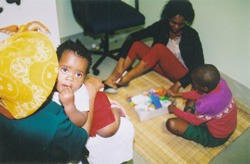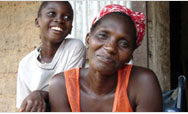You are here » Home » Telling Our Story
Success Story
Abuse support centers counsel victims of violence
Childline Heals Wounds of Violence and Abuse

| |
Photo: USAID
|
|
Children attend social work session at the Rape Survivors Unit of Umlazi Hospital in Durban.
“We have to change the idea of abuse. We can’t teach these kids to protect themselves — we must teach their communities to protect them.”
|
Dr. V.B. Mohomed works miracles from the room that serves as an office, an examination room and, often, she concedes, a kitchen. She keeps bread and peanut butter in a desk drawer to offer to the 100-150 rape victims who seek her care every month, many of whom arrive hungry and reluctant to speak.
As head of the Rape Survivors Unit of Umlazi Public Hospital, Dr. Mohomed works in coordination with Childline South Africa, an organization supported by USAID. Childline provides Dr. Mohomed with social workers to interview victims, counsel them and help them obtain short- and long-term care. For nearly two decades Childline has worked to prevent violence and abuse, offering educational, therapeutic and rehabilitative services to children and their families. With centers in six cities and projects in seven provinces, Childline has become a lifeline for South African communities.
The organization began with a 24-hour national crisis line on which counselors assist children, young people and their families in reporting abuse and seeking help. A seven-week training course for new crisis line counselers is offered four times a year.
“With children increasingly growing up with external caretakers as a result of the HIV/AIDS virus, we have seen abuse rates soar,” explained the crisis line director in Durban.
Durban’s call volumes are among the nation’s highest, averaging 19,000 a month. New cases are forwarded to the State Child Protection Unit, child welfare societies or other appropriate parties and monitored to ensure that each is appropriately addressed. A mammoth green filing cabinet houses thousands of cases pending with state authorities, but “we don’t give up,” says the crisis line director. Childline’s greatest obstacle has been its dependence on underfunded government child welfare services to respond to urgent calls, but it is working to build partnerships that will ease the process.
Childline is also the first organization in Kwa-Zulu-Natal to offer help for sexual offenders. As a part of its education and prevention initiatives, Childline hosts bi-monthly individual and group therapy sessions for child and adult sexual offenders.
In Childline’s newly painted treatment facilities a social worker sits on a straw mat cradling a young girl whose eyes barely move when the door opens. The child was brutally raped just two weeks ago by a man who came to her home to ask for directions. The Childline social worker will lead this 10-year-old through as many play therapy sessions as it takes to help her heal. Childline will continue to champion her cause. “We have to change the idea of abuse,” said one Childline social worker. “We can’t teach these kids to protect themselves — we must teach their communities to protect them.”
Print-friendly version of this page (379kb - PDF)
Click here for high-res photo
Back to Top ^ | 

